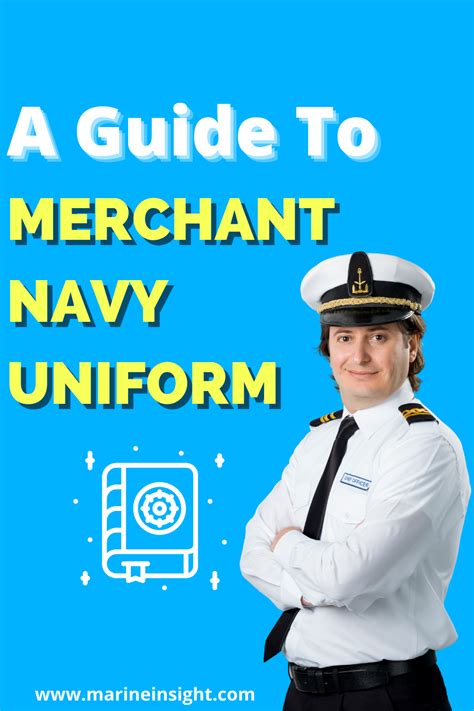Introduction
Merchant marine uniforms play a crucial role in maintaining safety, professionalism, and a sense of identity among seafarers. They serve as a visible representation of the merchant navy and the high standards it upholds. This comprehensive guide will delve into the different types of merchant marine uniforms, their significance, and the importance of maintaining proper dress codes.

Types of Merchant Marine Uniforms
Merchant marine uniforms vary depending on the rank, department, and occasion. Some of the most common types include:
Dress Blues
Dress blues are formal uniforms worn during official ceremonies, inspections, and other special occasions. They typically consist of a navy-blue jacket, trousers, and a white shirt with epaulettes and rank insignia.
Working Blues
Working blues are semi-formal uniforms worn for everyday operations on board vessels. They are designed to provide comfort, durability, and visibility. These uniforms typically include blue coveralls or trousers, a blue shirt, and a cap.
Tropical Whites
Tropical whites are worn in hot and humid climates. They consist of a white shirt with epaulettes, white trousers, and a white cap.
Deck Uniforms
Deck uniforms are designed for personnel working on the deck of a vessel. They feature a high-visibility vest or jacket, waterproof pants, and nonslip footwear.
Engineering Uniforms
Engineering uniforms are worn by personnel working in the engine room or other engineering areas. They are made of fire-resistant materials and often include coveralls, a shirt, and protective gloves.
Significance of Merchant Marine Uniforms
Merchant marine uniforms serve several important purposes:
Safety
Uniforms provide visibility and protection for seafarers working in hazardous environments on board vessels. High-visibility vests and fire-resistant materials help ensure their safety in case of accidents or emergencies.
Professionalism
Uniforms foster a sense of professionalism and discipline among merchant marine personnel. They instill a sense of pride and represent the high standards of the merchant navy.
Identity
Uniforms create a sense of identity and unity among seafarers. They distinguish merchant marine personnel from other civilians and represent the global nature of the industry.
Maintenance of Dress Codes
Maintaining proper dress codes is crucial for the safety and professionalism of the merchant navy. Seafarers must adhere to the following guidelines:
- Uniforms must be clean, pressed, and free of tears or stains.
- Rank insignia and other badges must be displayed correctly.
- Uniforms must be worn in accordance with the weather and occasion.
- Seafarers must not alter or modify their uniforms without authorization.
Common Mistakes to Avoid
When wearing merchant marine uniforms, it is important to avoid the following common mistakes:
- Wearing uniforms that are too loose or too tight.
- Displaying incorrect rank insignia or badges.
- Wearing uniforms that are not appropriate for the weather or occasion.
- Alterations to uniforms without authorization.
- Wearing uniforms in public without official business.
How to Step-by-Step Approach
To ensure proper wear of merchant marine uniforms, follow these steps:
- Ensure that the uniform is the correct size and fit.
- Clean and press the uniform according to the manufacturer’s instructions.
- Display rank insignia and other badges correctly.
- Wear the uniform in accordance with the weather and occasion.
- Report any tears or stains to a supervisor.
Benefits of Proper Uniform Maintenance
Proper maintenance of merchant marine uniforms brings several benefits:
- Enhances safety by ensuring visibility and protection.
- Maintains professional standards and instills pride.
- Fosters a sense of identity and unity.
- Prevents confusion and potential accidents.
- Demonstrates respect for the merchant navy and its traditions.
Conclusion
Merchant marine uniforms are an essential part of the safety, professionalism, and identity of seafarers. By maintaining proper dress codes, seafarers contribute to a positive image of the merchant navy and promote a culture of safety and excellence.
Additional Resources
Tables
Table 1: Types of Merchant Marine Uniforms
| Type | Purpose | Features |
|---|---|---|
| Dress Blues | Formal ceremonies and inspections | Navy-blue jacket, trousers, white shirt |
| Working Blues | Everyday operations | Blue coveralls or trousers, blue shirt, cap |
| Tropical Whites | Hot and humid climates | White shirt, white trousers, white cap |
| Deck Uniforms | Work on the deck | High-visibility vest or jacket, waterproof pants, nonslip footwear |
| Engineering Uniforms | Work in the engine room | Fire-resistant coveralls, shirt, protective gloves |
Table 2: Importance of Merchant Marine Uniforms
| Importance | Description |
|---|---|
| Safety | Visibility, protection in hazardous environments |
| Professionalism | Foster discipline, instill pride |
| Identity | Create a sense of unity, distinguish seafarers |
Table 3: Common Mistakes to Avoid
| Mistake | Description |
|---|---|
| Incorrect size or fit | Loose or tight uniforms can compromise safety |
| Incorrect insignia or badges | Confusion, potential accidents |
| Inappropriate weather or occasion | Poor visibility, discomfort |
| Unauthorized alterations | Compromise uniform standards |
| Wearing uniforms in public without official business | Violation of dress codes |
Table 4: Benefits of Proper Uniform Maintenance
| Benefit | Description |
|---|---|
| Enhanced safety | Visibility, protection |
| Professional standards | Pride, positive image |
| Identity and unity | Sense of belonging |
| Prevention of accidents | Visibility, proper fit |
| Respect for merchant navy | Upholding traditions |
